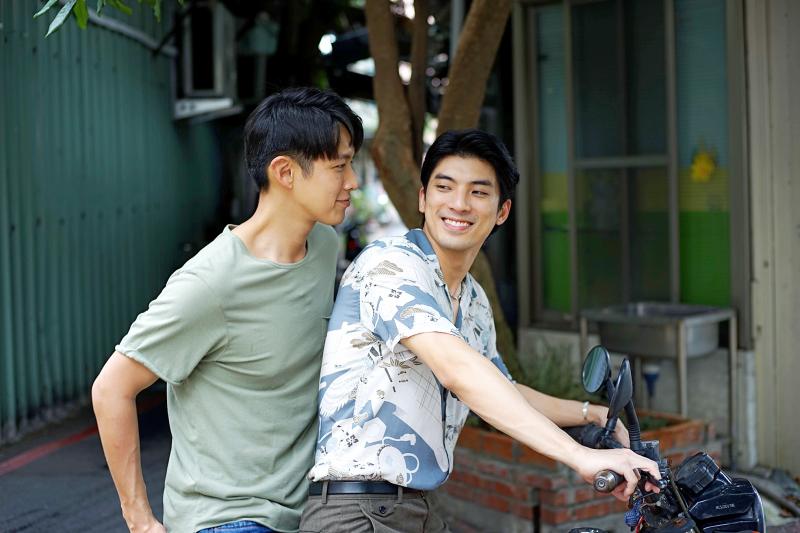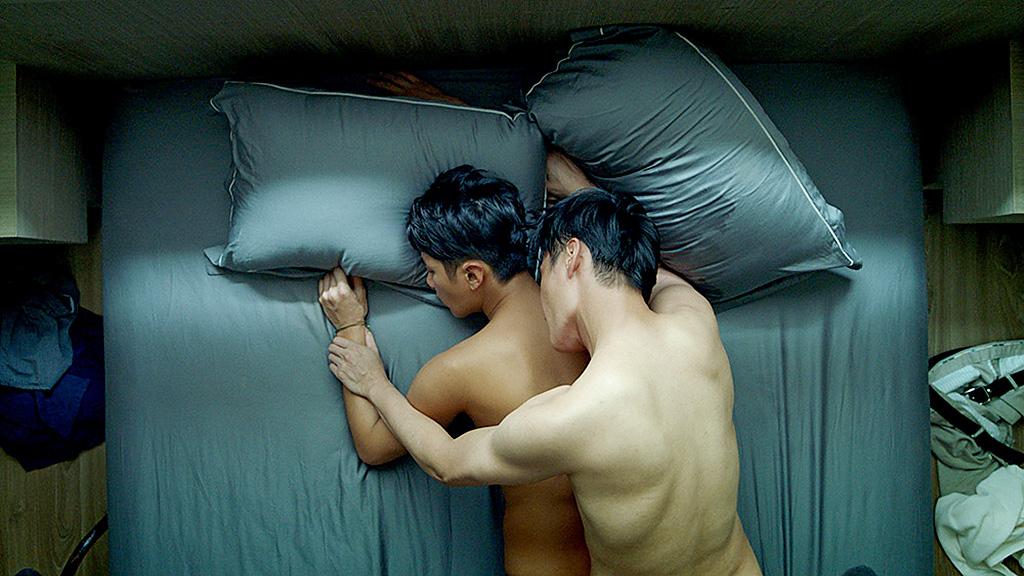Foreign viewers at the Cannes premiere of Moneyboys (金錢男孩) may not have noticed the glaring incongruities that persist through the movie, but Taiwanese viewers certainly will. They’re apparent to the point that it’s difficult to enjoy the movie.
First of all, the entire film is obviously shot in Taiwan, but the plot is set in fictional locales in southern China, with most secondary characters, passersby and television announcers speaking in Beijing-accented Mandarin.
This melancholy tale revolves around gay sex workers in China and the unique challenges they face, especially regarding traditional expectations, including marriage, and the large-scale rural-to-urban migration of young people. This is an interesting topic, as it’s taboo in China and significantly different from the LGBTQ situation in Taiwan. Shooting it in Taiwan was probably a way for this story to be told, as Chinese authorities do not welcome films depicting overt homosexuality. And it’s quite explicit in Moneyboys, especially the sex scenes.

Photo courtesy of Cola Films
Which brings us to the second problem. Given the tensions between Taipei and Beijing, it might raise a few eyebrows for Taiwanese to see their homeland portrayed as part of China. Politics aside, however, CB Yi, the Chinese-Austrian director who is using a pseudonym for fear of reprisals against relatives still living in China, has made some other questionable decisions.
Take language, for example. Despite his superb acting, which earned him a Golden Horse nomination, Taiwanese lead actor Kai Ko (柯震東) delivers his lines as A-fei in an unnatural Mandarin accent, while using vocabulary that’s more common in China. So does the other Taiwanese principal actor, JC Lin (林哲熹), who portrays A-fei’s former lover Xiao-lai.
This just scratches the surface of the linguistic trainwreck. At one point, A-fei returns to his home village, where everyone speaks Hoklo (also known as Taiwanese) — except for his father and childhood friend A-long (Bai Yufan, 白宇帆), both of whom inexplicably speak with strong Beijing accents and obviously cannot speak the local tongue. This is just sloppy, especially since A-long eventually takes on a significant role in the film.

Photo courtesy of Cola Films
Perhaps A-fei’s father moved to the village later in life, but it is simply not believable that two people of the same generation from the same village speak with radically different accents.
The city that A-fei lives in feels like Taiwan at one moment and China in another; one simply can’t just package one as another as the scenery and atmosphere in the two places are markedly different. It doesn’t take much to realize that the street scenes are in Taipei and Keelung, with landmarks that give the exact locations away. Adding Beijing-accented background chatter simply does not cut it. Yi has more control over the shiny indoor bars, traditional gardens and other interior scenes that feel very much like China.
All of this wouldn’t be a problem if the target audience was purely Western, especially when the highly stylized Eastern aesthetics and cinematography are amped up to accentuate the foreignness of the settings. But especially as a co-Taiwanese production, these issues should have been considered more carefully.
Anyhow, Ko should still be praised for his intense and heartfelt performance as a complex character who is torn between worlds. He toils in risky, illicit work to support his family back home, but they shun him due to the rumors of what he does. He starts a relationship with A-long, but cannot forget his former lover Xiao-lai, a gay man now married with children — a phenomenon in China that has gained much attention in recent years. Ko struggles between his work and his emotional needs, especially for romance, and seemingly engages in self-sabotage.
Bai also holds his own as the more idealistic, playful counterpart to Ko, and the two have great chemistry and pretty much carry the film.
Despite its bright color palette and bursts of energy, however, Moneyboys is more of a contemplative, drawn-out affair that dives deep into the psyche of a character stuck in a world that he struggles to thrive in. In a vacuum, it’s a decent effort that provides a narrow yet empathetic look at a subject seldom discussed in China. Still, the aforementioned distractions are too much to bear.

Taiwan has next to no political engagement in Myanmar, either with the ruling military junta nor the dozens of armed groups who’ve in the last five years taken over around two-thirds of the nation’s territory in a sprawling, patchwork civil war. But early last month, the leader of one relatively minor Burmese revolutionary faction, General Nerdah Bomya, who is also an alleged war criminal, made a low key visit to Taipei, where he met with a member of President William Lai’s (賴清德) staff, a retired Taiwanese military official and several academics. “I feel like Taiwan is a good example of

March 2 to March 8 Gunfire rang out along the shore of the frontline island of Lieyu (烈嶼) on a foggy afternoon on March 7, 1987. By the time it was over, about 20 unarmed Vietnamese refugees — men, women, elderly and children — were dead. They were hastily buried, followed by decades of silence. Months later, opposition politicians and journalists tried to uncover what had happened, but conflicting accounts only deepened the confusion. One version suggested that government troops had mistakenly killed their own operatives attempting to return home from Vietnam. The military maintained that the

Before the last section of the round-the-island railway was electrified, one old blue train still chugged back and forth between Pingtung County’s Fangliao (枋寮) and Taitung (台東) stations once a day. It was so slow, was so hot (it had no air conditioning) and covered such a short distance, that the low fare still failed to attract many riders. This relic of the past was finally retired when the South Link Line was fully electrified on Dec. 23, 2020. A wave of nostalgia surrounded the termination of the Ordinary Train service, as these train carriages had been in use for decades

Lori Sepich smoked for years and sometimes skipped taking her blood pressure medicine. But she never thought she’d have a heart attack. The possibility “just wasn’t registering with me,” said the 64-year-old from Memphis, Tennessee, who suffered two of them 13 years apart. She’s far from alone. More than 60 million women in the US live with cardiovascular disease, which includes heart disease as well as stroke, heart failure and atrial fibrillation. And despite the myth that heart attacks mostly strike men, women are vulnerable too. Overall in the US, 1 in 5 women dies of cardiovascular disease each year, 37,000 of them